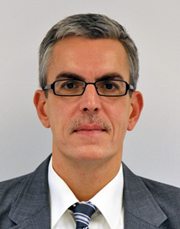
13th International Forum on Embedded MPSoC and Multicore
July 15-19, 2013, Otsu, Japan

Speaker:
Rainer Leupers, RWTH Aachen University, GermanyTitle:
Two new use cases for Virtual PlatformsAbstract:
Virtual Platforms (VP's) are being widely used for early system prototyping, embedded SW development, and HW/SW integration. However, VP's also imply considerable investments in modeling effort and tools license fees. This demands for extended VP life cycles and more versatility. In this presentation we focus on two promising future VP use cases. First we outline a methodology to enable fast and accurate VP based power estimation, calibrated via layout-level power traces. The second use case employs advanced VP based event monitoring in order to detect SW bugs in multicore systems.
Bio:
Rainer Leupers received the M.Sc. (Dipl.-Inform.) and Ph.D. (Dr. rer. nat.) degrees in Computer Science with honors from the Technical University of Dortmund, Germany, in 1992 and 1997. From 1997-2001 he was the chief engineer at the Embedded Systems chair at TU Dortmund. During 1999-2001 he was also a team leader at ICD, where he headed industrial service projects. In 2002, Dr. Leupers joined RWTH Aachen University as a professor for Software for Systems on Silicon. Since then, he has also been a visiting faculty member at the ALARI Institute in Lugano. His research and teaching activities comprise software development tools, processor architectures, and electronic design automation for embedded systems, with emphasis on multiprocessor systems-on-chip. He published numerous books and technical papers, and he served as program committee member and topic chair of leading international conferences, including DAC, DATE, and ICCAD. He was a co-chair of the MPSoC Forum and SCOPES. Dr. Leupers received several scientific awards, including Best Paper Awards at DATE 2000, 2008 and DAC 2002, and he holds several patents on processor design automation technologies. He has been a co-founder of LISATek, an EDA tool provider for embedded processor design, now part of Synopsys Inc. He has served as consultant for various companies, as an expert for the European Commission, and in the management boards of compound research projects like UMIC, HiPEAC, and ARTIST.